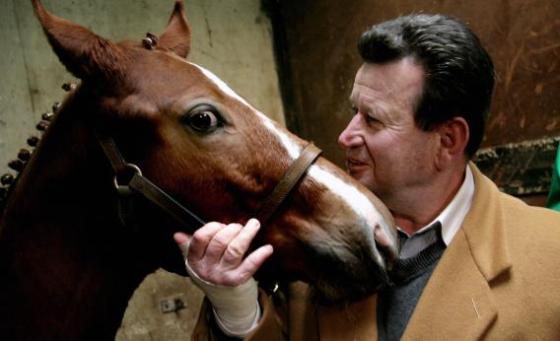
A foal cloned from the grand prix champion gelding ET poses next to former Austrian Olympic rider Hugo Simon. Photo by Laurent Cipriani/AFP/Getty Images.
Equine welfare is mentioned in the latest hot topic — the FEI’s decision to accept cloned horses in the 2012 London Olympics. Here’s what a report by NaturalNews.com states about that:
In a surprising but not shocking development, the Federation Equestre Internationale has decided to overturn a ban previously placed on cloned equines.Where does the welfare part come in? It states in a Slate article that:
According to The Chronicle of the Horse at their recently held sports forum it was said, “The FEI will not forbid participation of clones or their progenies in FEI competitions. The FEI will continue to monitor further research, especially with regard to equine welfare.”
So far, the cloned horses have been used mostly for breeding rather than competing.How come?
An MSNBC article on the Center for Genetics and Society website about racehorse cloning explains:
Using clones for breeding could allow owners to continue to race the original horses rather than be forced to retire them, Texas A&M’s Hinrichs said.A couple of major concerns about breeding with cloned horses are lifespan and immunity issues. Reports vary, but most agree 10-12 years tops life expectancy for a cloned horse. Genetic weaknesses start showing up in second generation cloned horses that compromise their immune systems.
“You could take cells from every horse when they’re 2 years old – the younger the cells, the better for cloning – then run your horses for as long as you want,” said Hinrichs, who has cloned 13 horses, 11 of which are still living. ” . . . The cloned foal can go to stud and produce the offspring that the original horse would be producing if it were retired.”
That, says Gregg Veneklausen, a Texas vet who works with ViaGen, could move racing breeders away from emphasizing “win early” pedigrees at the expense of soundness and long-term success.
“When you retire your biggest stars so young, what you’re selecting for – whether you know it or not – is young speed,” he said. “If we let them run until 8, one of them might win $12 million instead of $200,000 and see his value as a stallion increase as a result.”
Good or bad, you decide, but that takes care of the breeding aspect. What about competing? It seems it may be too early to tell.
For example, in a report on the SportsAdept.com website they mention:
Until now, breeding was the only activity in which the cloned horses have been used.and
From the hundreds of cloned competitive horses that have now reached Europe after leaving the United States, practically none of them are old enough to compete in a professional race, because the practice of cloning is fair[l]y new.

One of two healthy clones of the famous Dutch dressage stallion Jazz born in July, 2012, in the US. The Broere family commissioned French company Cryozootech to clone Jazz in March, 201. Source image.
Two healthy clones of the famous Dutch dressage stallion Jazz have been born in the US, and will soon be sent to Broere Stud, where Jazz is domiciled.What happens to the unhealthy ones? And define “unhealthy”.
Bred by Huub and Tiny van Helvoirt, Jazz, now 21, is owned by the Broere family. They commissioned French company Cryozootech to clone Jazz in March, 2011.
The resulting clone foals are now two months old.
In other news, the American Quarter Horse Association (AQHA), who will register just about anything, currently prohibits clones. That may be about to change. In April of this year, the AQHA reported that member, Jason Abraham, and two of his related companies filed an anti-trust lawsuit against them seeking to reverse the organization’s cloning rule that has been in effect since 2004.
But back to where we began. Why the statement “The FEI will continue to monitor further research, especially with regard to equine welfare“? (emphasis added)









No comments:
Post a Comment